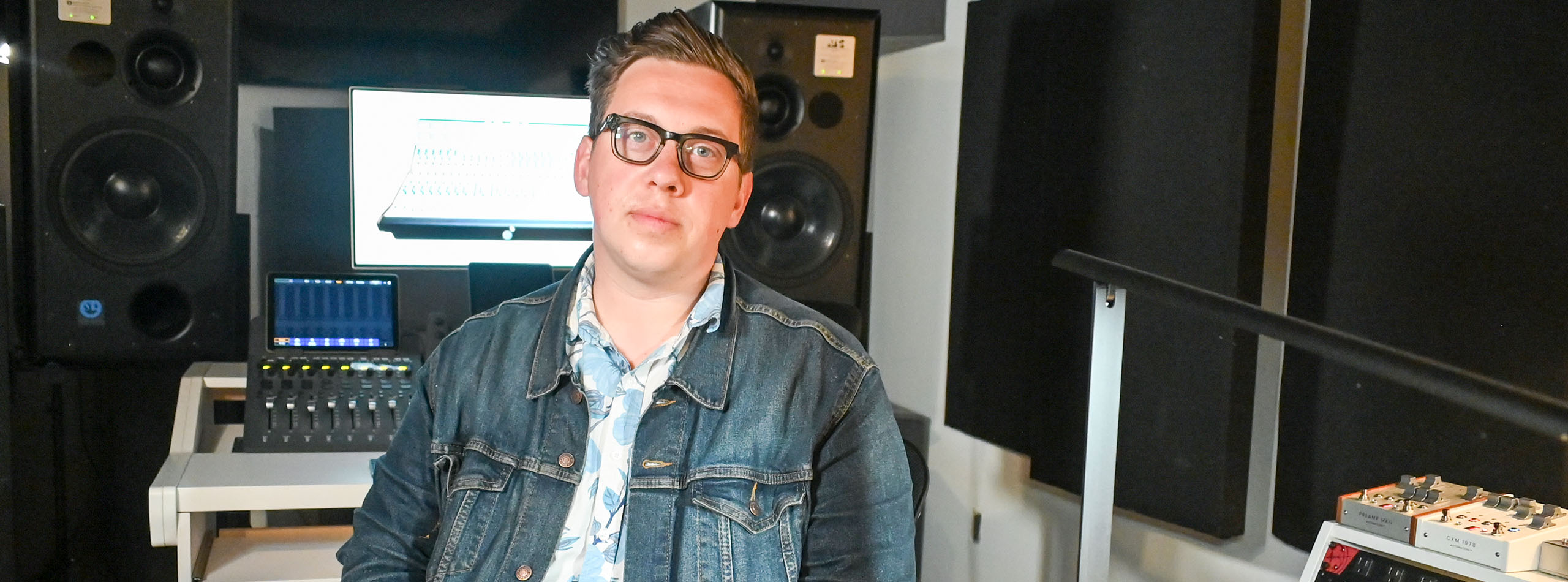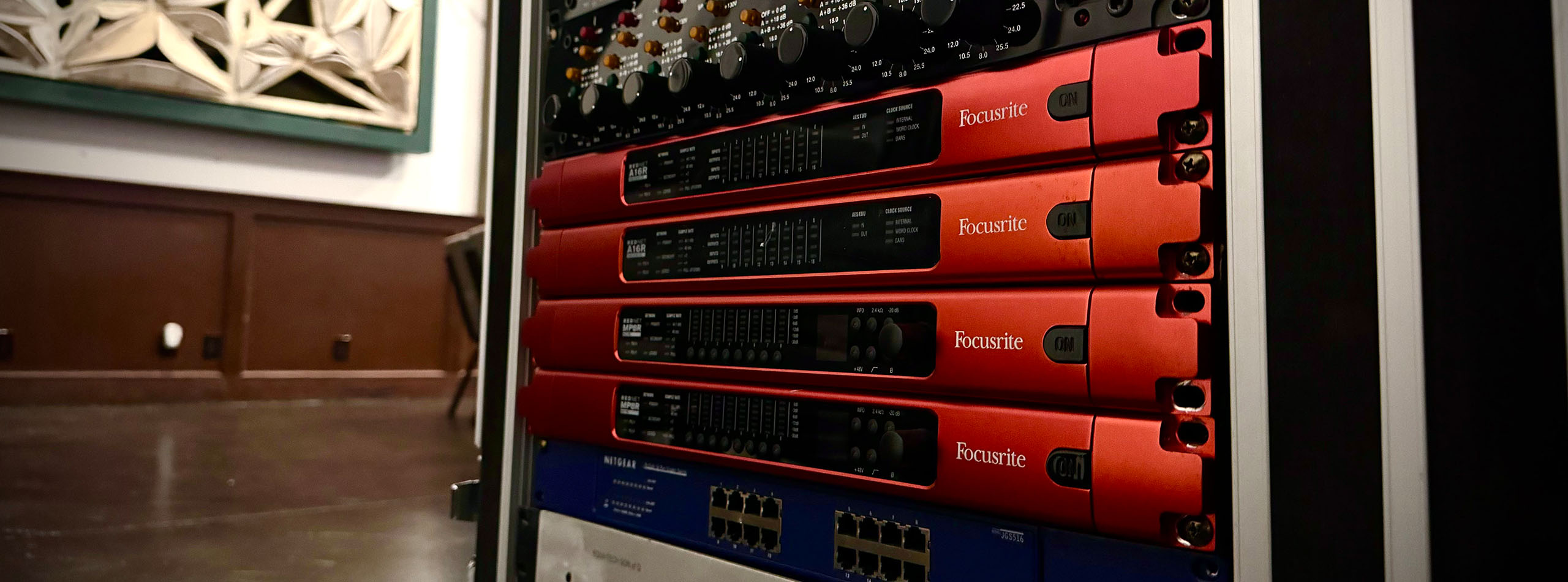Focusrite RedNet components chosen for Heights Theater Scoring Stage in Cleveland
The historic Heights Theater in Cleveland, Ohio, opened in 1919 as a movie palace. In recent years, it’s transformed into a vibrant community hub, featuring a whiskey bar, hookah parlor, Mexican restaurant, and multi-room music recording facility.
The Heights Theater Scoring Stage is big enough to accommodate over 100 musicians, and studio manager Joel Negus aims to attract orchestral recording projects to the facility. To achieve this, he’s begun building a Dante®-networked audio system featuring Focusrite RedNet converters, microphone preamps, and interfaces.

"We're aiming to address the shortage of large-scale ensemble recording spaces here in the U.S.," explains Joel, a classically trained multi-instrumentalist, composer, and producer with experience across jazz, metal, and indie genres. "I also envision this as a satellite for the L.A. scene," he adds, capitalizing on the esteemed Cleveland Orchestra, Oberlin Conservatory, and Cleveland Institute of Music, where he honed his craft. "This is another significant scoring stage they can utilize. With several daily direct flights between Cleveland and L.A. at affordable rates, it's convenient. Whether using our local players or bringing in others, the options are wide open."
Joel’s assembled a mobile rack system designed to capture large ensembles with uncompromising quality. His mobile setup includes two Focusrite RedNet MP8R mic preamps and two RedNet A16R analog I/O interfaces, managing A/D conversion for 32 channels of premium analog mic preamps. In the control room, the main recording setup centers around a RedNet PCIeR card and a Red 16Line interface.
"We were keen on investing in an Ethernet-based system, and Dante was the logical choice," Joel explains. "When it comes to Dante, Focusrite is synonymous with reliability and performance in professional recording environments. If you're using a Dante system in high-level recording, you'lllikely findFocusrite equipment there. There's a reason why RedNet is favored in top-tier scoring stages and major commercial studios."
“We chose to go the Dante route because the space is so large and because we wanted to network the entire facility, including Studio B upstairs, which used to be the balcony,” he continues.“We wanted to build out the infrastructure to be able to stream in 4K and do remote sessions with people around the world at a high level. We also have some incredible spaces in Cleveland, so for the right project, to be able to roll everything out the door and do a remote session at a cathedral that has a seven-second decay time was also something that we had in mind. All that flexibility is coming from the high-quality conversion that we’re getting from Focusrite.”

Joel is also using a RedNet AM2 for stereo audio monitoring (via headphones or monitors) in his control room. “We have one AM2 currently, and we intend to grab additional units. In scoring sessions, there are often numerous people in the control room, so we want them to be able to monitor exactly how they’d prefer, and having the AM2 at the ready helps us facilitate that. And when we want to go elsewhere in the facility, the AM2 is Dante-based, so we can set up monitoring literally anywhere in the building.”
In recent years, Joel's connected with a community of analog, synth-based scoring composers. Through these connections, he’sproduced a variety of projects for visual media. He’s also the CEO and co-owner of Cleveland Scoring, a separate company but the stage’s main client. “We rent the space here at the Heights Theater the most. Cleveland Scoring is the outward facing entity that’s contracting high-end scoring sessions for film, television, and video games,” he elaborates. “I just don't think there is a replacement for getting a bunch of people in a room and making some magic. So I really wanted to develop the infrastructure in such a way that engineers from anywhere can come here and have the recording system make sense.”
For an audio professional and someone who’s not a networking expert, the idea of getting started with Dante can seem daunting. “I was concerned about the learning curve. But after just a few YouTube videos, I’ve been able to figure it out pretty easily. Once you get it, it’skind of like a patchbay,” says Joel, who grew up in studios, since both his parents are also musicians. “It’s been a rock-solid system. Everything is working the way it should and just pops up onto the network.”
The scoring stage of the Heights Theater boasts a 40-foot ceiling and recently underwent a renovation to transform the room’s acoustics. Architectural designer Clifford Benjamin Herring of PAADG Design led the renovations, with Nick Dulworth of Threshold Acoustics consulting on the project, including the installation of 10 striking acoustic panels around the walls. Describing the panels, Joel says, “They are as custom as you can get. Each one of those panels has 1,000 individual cuts of wood that were all put together by hand in the space. About 100 volunteers and neighbors had their hands on them. I spent eight months working 30 hours a week.”
“The result is a room with a decay time of around 1.8 seconds, depending on the setup,” he says. “We think we have really accomplished something special here, even before we get to any of the technology. You can stand on opposite sides of the room and whisper to each other. The clarity comes from about 16 inches of absorption behind all the wood. People can do whatever they want in the mix later, but we’re just focused on pristine acoustic capture. And Focusrite is helping us translate our room with their brilliant A/D technology.”

